
Although outstanding credit is definitely a target worth achieving, having one of the highest credit scores does not guarantee that you will be authorised for a credit card. You may have had the unpleasant experience of being refused a credit card despite having an outstanding credit score. And you were possibly shocked at the move. So, of course. One of the benefits of obtaining excellent credit is that the applications are accepted.
Unfortunately, credit ratings are not the only credit card issuers who deem you eligible for a credit card. A variety of factors can lead to a refusal to apply, even though you have excellent records.
Insufficient salary
Or, your salary is not high enough for the credit card you are eligible for. Trying to find out which credit cards suit your salary is a bit of a guessing game. To a certain extent, you would trust the credit card issuers to accept credit cards that best suit your income. More prestigious credit cards, those with lucrative benefits for those with excellent scores, typically require higher salaries.
There are so many credit cards
Credit card issuers also weigh the number of credit cards you have before determining whether to accept your credit card application. There is no particular amount of credit cards appropriate to credit card issuers, at least not one that has been made public. You might well be able to afford an extra credit card, but the issuer of the credit card really doesn't want to take the chance.
So much of the loan
Debt, whether it's a credit card debt or a loan debt, will prohibit you from being accepted for a credit card, even though you're servicing your debt well enough to obtain an outstanding credit score.
Credit card issuers may deem your debt burden too high and reject your credit card application rather than expand the extra credit that you may default on. It's just as well. Adding an additional credit card to a high debt burden can overturn your finances.
No recent revisions to the credit report
You may have recently paid off a high balance or closed a few old credit cards, but that record may not appear on your credit report for a few more days, depending on how much the borrower files to the credit bureaus. It takes time for credit card issuers to give the account data to credit bureaus, so slightly expired credit report information is very common.
New Developments Too
Although credit report enquiries might not have a major effect on your credit score – they're just 10% of your score – they do influence whether you're approved. Multiple credit card enquiries in a very short period may mean that you're having financial problems or taking on too much credit, something considered problematic by credit card issuers.
If you apply for multiple credit cards within a short period of time, the first few credit card issuers can accept your credit card applications. But after a few enquiries have entered your credit report, you may encounter a refusal to apply.
A recent account opened
Some credit card issuers can reject your credit card application if you have only opened one new credit card in the last few months. This doesn't actually mean that you have so many credit cards, but a credit card issuer may like to see more background on your current credit card before agreeing to award you additional credit.
Check on Frozen Credit
If you have posted a fraud notice or a security freeze on your credit report, your credit card request may be rejected and the issuer of your credit card can not delete your credit report. In the event of a fraud notice, the creditor would have to take extra measures to check your identity before accepting your application for a credit card. In a security freeze, you will need to activate your credit records – at least through the office whose record the applicant is trying to review – so that the credit card application may be done.
Default New Credit Card
Any credit card issuers will keep a prior default or against you, particularly though the defaulted account has passed the credit reporting date, and even though you've strengthened your credit since then. Under this case, it might be useful to speak to anyone from the issuer of the credit card. Clearing the default balance may give you a chance to get a new account with the issuer of the credit card.
What to do if your application for a credit card is rejected
Many credit card applications are handled automatically using a method that retrieves your credit history, integrates it with your credit card application information and applies it to any predefined requirements. The machine has the right to look at the facts subjectively and make an exception to the criterion.
Luckily, several credit card issuers offer a reassessment phone number so you can dial and chat with someone about your submission. You should argue your case, justify why you're a successful choice for a credit card, and if you're lucky, you'll be accepted.
When you are turned down for a credit card, the issuer of the credit card will send a letter telling you of the particular reason or reasons for your rejection. You can either submit a free credit score if your credit score has been included in the decision or guidelines for receiving a free credit card if your credit rating has been included in the decision. Use this knowledge to boost your chances of getting your next credit card application approved.